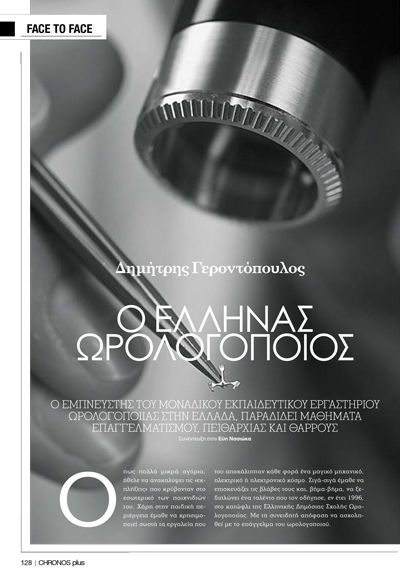Dimitris Gerontopoulos - The Greek Watchmaker
The founder of Greece’s only private professional watchmaking school teaches the values of professionalism, discipline, and courage.
Like many young boys, he was fascinated by discovering what lay hidden inside his toys. Through curiosity and experimentation, he learned how to properly use tools, revealing the mechanical, electrical, and electronic worlds inside. Over time, he developed a talent for repairs, which ultimately led him to enroll in the Greek Public School of Watchmaking in 1996, making a conscious decision to pursue watchmaking as a career.
How Did You Enter the World of Watchmaking?
After completing my studies at the Greek Public School of Watchmaking in 1996, I started working as a technician in Greek companies. However, my real knowledge leap came during my eight-year tenure at a multinational company.
Training abroad and attending specialized seminars changed my entire perspective on watchmaking. I later graduated from WOSTEP (Watchmakers of Switzerland Training and Educational Program), one of the most prestigious independent watchmaking institutes in the world. I also obtained “Licence” recognition from ENIC-NARIC France, the French Diploma Recognition Institute.
When Did You Start Teaching Watchmaking?
One year after returning to Greece from Switzerland, I established Watchmaking, a 100m² training center in Athens, with the goal of:
- Providing professional watchmaking training
- Managing technical departments
- Setting up and equipping workshops
- Handling all types of watch repairs and servicing
The Watchmaking facility is designed to eliminate distractions, creating an ideal workspace. The center follows international watchmaking education standards and is equipped with professional tools imported from abroad.
How Long Do the Training Programs Last? Who Can Enroll?
Watchmaking offers training programs for:
- Beginners with no experience
- Skilled or professional watchmakers
- Jewelers and goldsmiths
- Hobbyists who love timepieces
In many countries, watchmaking is a highly respected and well-paid profession. Our goal is to train individuals who are disciplined, organized, and ambitious, preparing them for a career in a demanding and prestigious field.
Graduates are trained to repair, maintain, and even build precision timepieces with both economic and sentimental value.
We maintain small class sizes (2-7 trainees per session) to ensure personalized learning and skill development.
Training Program Structure
First Cycle (Fundamentals of Watchmaking)
- Training in manual-wind mechanical watches, automatic watches, and quartz movements
- Hands-on practice in disassembly & reassembly
- Component identification and troubleshooting
Second Cycle (Advanced Watchmaking)
- Training in chronographs (mechanical & quartz)
- Intensive practical exercises with complex movements
- Transition from technical skills to artistry, refining techniques and developing personal methods
We also offer:
- 3-day introductory workshops where students learn to disassemble and reassemble a watch, leaving with the timepiece they built.
- Fast-track & specialized seminars for students at different skill levels.
Is There a Future for Watchmaking in Greece?
In Switzerland, Japan, the UK, and France, watchmaking is recognized as a highly skilled craft with strong demand.
In Greece, the industry has only recently started gaining momentum. Previously, a lack of knowledge and professionalism led to the decline of the watch repair industry.
However, demand for well-trained watchmakers is now rising, particularly among companies specializing in watch repairs and sales.
Anyone who invests in proper education, develops their skills, and has confidence in their abilities can build a successful career in watchmaking.
Are Greek Customers Knowledgeable About Watches?
Only a small percentage of people in Greece truly understand how to care for their watches.
This is partly due to customers’ lack of awareness, but also because many sales staff lack in-depth knowledge about the timepieces they sell.
Retailers should train their employees so that they can properly educate customers about:
- How to wear & handle automatic watches
- Service intervals for watch maintenance
- Watch functions (crown operation, chronograph use, etc.)
- How to clean & maintain a waterproof watch
How Often Should a Watch Be Serviced?
All watches require servicing every 3-5 years, as recommended by manufacturers.
A watch movement operates 24/7, much like a human heart, constantly enduring:
- Friction & wear
- Shocks & vibrations
- Extreme temperatures & pressure changes
Regular service ensures that:
- Components are cleaned & lubricated
- Worn-out parts are replaced
- Water resistance is maintained
What Are Your Future Professional Goals?
This year, I am completing my MBA at the University of Derby—but my education will not stop there.
My next goal is to graduate from the British Horological Institute (BHI) or the American Watchmakers-Clockmakers Institute (AWCI).
These qualifications will help me expand Watchmaking further, and we are already collaborating with private institutions to gain state recognition for our diploma.
What Advice Would You Give to Someone Interested in Watchmaking?
I would enthusiastically encourage any young person to pursue watchmaking!
If you have:
- Patience
- Perseverance
- Discipline
- Cleanliness
- Focus
- Courage A touch of perfectionism
…then watchmaking is for you!
Whether as a technician, designer, or manufacturer, watchmaking will always be a fascinating and rewarding career—as long as humanity needs to measure time.
CHRONOS plus - November 2015
FACE TO FACE
From Evy NasiokaSee the article

